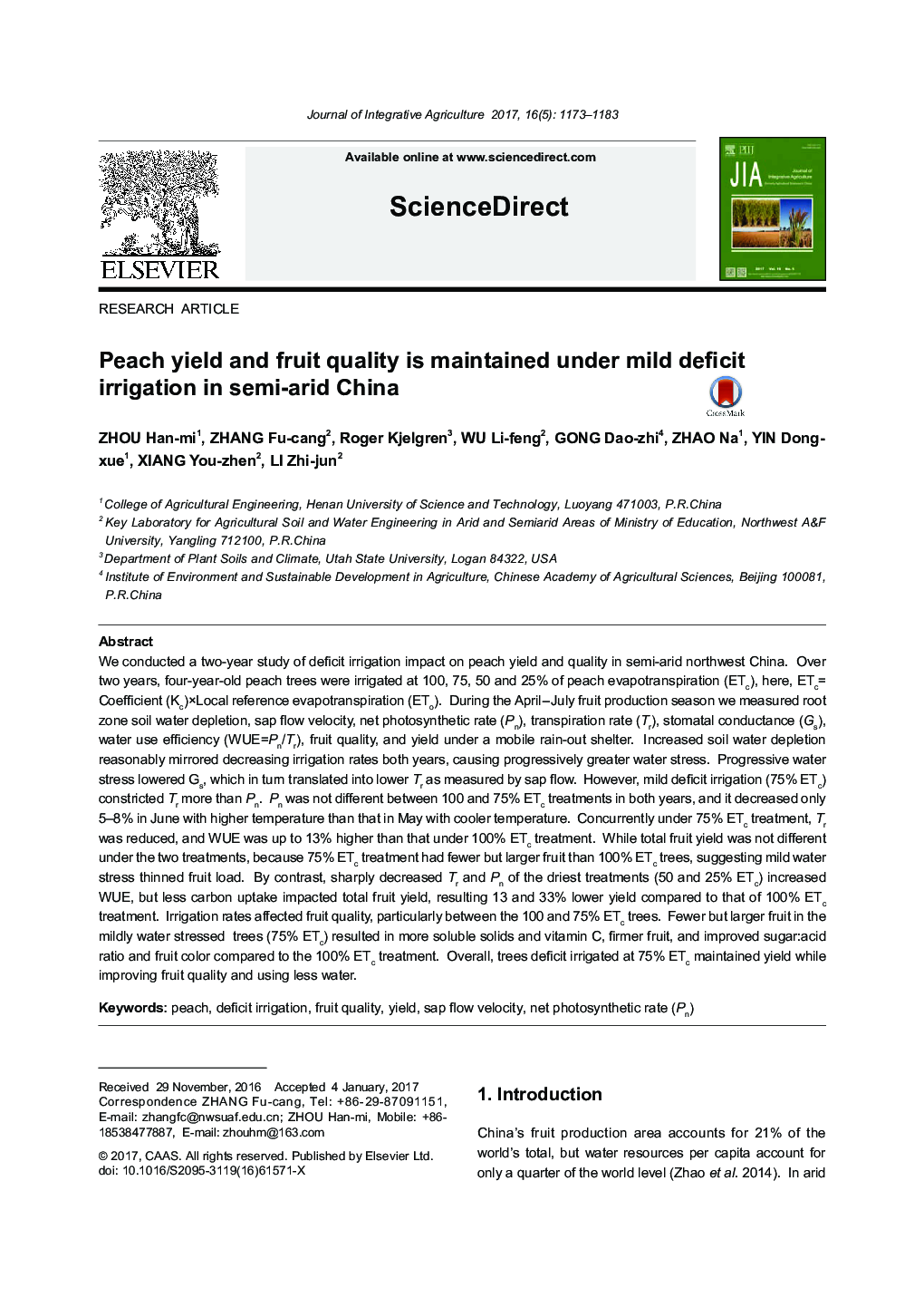| کد مقاله | کد نشریه | سال انتشار | مقاله انگلیسی | نسخه تمام متن |
|---|---|---|---|---|
| 8876015 | 1623709 | 2017 | 11 صفحه PDF | دانلود رایگان |
عنوان انگلیسی مقاله ISI
Peach yield and fruit quality is maintained under mild deficit irrigation in semi-arid China
ترجمه فارسی عنوان
عملکرد هویج و کیفیت میوه در آب آشامیدنی کم خونی در نیمه خشک چین حفظ می شود
دانلود مقاله + سفارش ترجمه
دانلود مقاله ISI انگلیسی
رایگان برای ایرانیان
موضوعات مرتبط
علوم زیستی و بیوفناوری
علوم کشاورزی و بیولوژیک
علوم کشاورزی و بیولوژیک (عمومی)
چکیده انگلیسی
We conducted a two-year study of deficit irrigation impact on peach yield and quality in semi-arid northwest China. Over two years, four-year-old peach trees were irrigated at 100, 75, 50 and 25% of peach evapotranspiration (ETc), here, ETc= Coefficient (Kc)ÃLocal reference evapotranspiration (ETo). During the April-July fruit production season we measured root zone soil water depletion, sap flow velocity, net photosynthetic rate (Pn), transpiration rate (Tr), stomatal conductance (Gs), water use efficiency (WUE=Pn/Tr), fruit quality, and yield under a mobile rain-out shelter. Increased soil water depletion reasonably mirrored decreasing irrigation rates both years, causing progressively greater water stress. Progressive water stress lowered Gs, which in turn translated into lower Tr as measured by sap flow. However, mild deficit irrigation (75% ETc) constricted Tr more than Pn. Pn was not different between 100 and 75% ETc treatments in both years, and it decreased only 5-8% in June with higher temperature than that in May with cooler temperature. Concurrently under 75% ETc treatment, Tr was reduced, and WUE was up to 13% higher than that under 100% ETc treatment. While total fruit yield was not different under the two treatments, because 75% ETc treatment had fewer but larger fruit than 100% ETc trees, suggesting mild water stress thinned fruit load. By contrast, sharply decreased Tr and Pn of the driest treatments (50 and 25% ETc) increased WUE, but less carbon uptake impacted total fruit yield, resulting 13 and 33% lower yield compared to that of 100% ETc treatment. Irrigation rates affected fruit quality, particularly between the 100 and 75% ETc trees. Fewer but larger fruit in the mildly water stressed trees (75% ETc) resulted in more soluble solids and vitamin C, firmer fruit, and improved sugar:acid ratio and fruit color compared to the 100% ETc treatment. Overall, trees deficit irrigated at 75% ETc maintained yield while improving fruit quality and using less water.
ناشر
Database: Elsevier - ScienceDirect (ساینس دایرکت)
Journal: Journal of Integrative Agriculture - Volume 16, Issue 5, May 2017, Pages 1173-1183
Journal: Journal of Integrative Agriculture - Volume 16, Issue 5, May 2017, Pages 1173-1183
نویسندگان
Han-mi ZHOU, Fu-cang ZHANG, Kjelgren Roger, Li-feng WU, Dao-zhi GONG, Na ZHAO, Dong-xue YIN, You-zhen XIANG, Zhi-jun LI,
